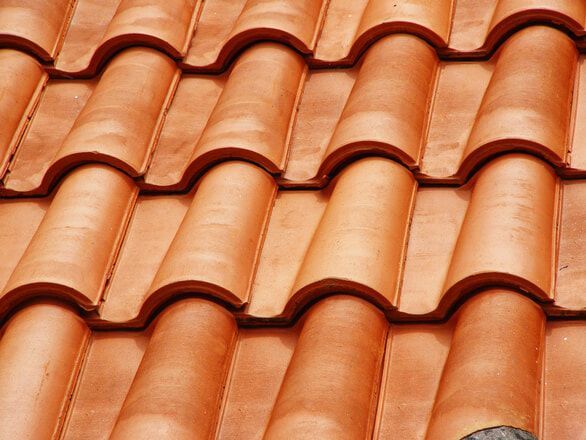TILE ROOFING

Call: 808-758-5256
Tile Roofing
Do you live in a hot location? Clay tile roofing is a popular choice for homes in warm climates. While it is very common to find clay tile roofing on Florida or California roofs, it can work well with most any design scheme. Combining one of the most common building materials with more contemporary materials like glass, metal, or wood roofing contrives a unique, beautiful architectural contrast that will attract attention to your home design. In addition, clay tiles, that are made of all natural materials, will keep their rich, warm, earth hues for at least a 100 years.
Clay tiles are also class-A fire rated and are non-combustable. This type of roofing is easily maintainable and you should be able to find a state or federal tax credit for the installation of a clay roof since they are an energy efficient type of roof.
TYPES AND STYLES OF CLAY TILE ROOFING-
Roofing tiles are made from clay or concrete and can be shaped in numerous different ways, even to the extent of appearing like wood shake.
- Terracotta clay is very popular for clay roofs since it will not change color with age. Concrete can fade and clay will actually get darker, but terracotta will maintain its color because it is baked into the clay. Many ancient terracotta artifacts maintain the original color they had when they were created.
- Synthetic clay is an alternative to natural clay roofing tiles and are made in the style of concrete tile roofing and metal tile roofing.
- Upon deciding on which design of clay roofing tiles you want to buy, there are four popular styles to choose from including Spanish tile, interlocking shingle style, mission style, and French tile clay roofs.
- You will want to get in touch with a reliable roof contractor in your area to determine if your home can handle clay tile roofing.
Clay Tile Roofing Costs-
The typical cost to install a clay tile roof currently is anywhere between $23,200 and $42,200 depending on the pitch, slope, and measurements of your roof. The national average cost is $11.00, but can range between $7.90 to $14.10 or $790 to $1,410 per square foot installed. These price ranges include materials and labor costs, and are determined on a standard 3,000 square foot roof.
Keep in mind that costs will vary from region to region and state to state.
Other Factors to Consider- Here are some other things to consider before building a clay tile roof on your home.
- Degree of Roof Slope. If your roof’s slope 18 degrees or less, then clay roofing tiles may not be the best material choice for your home considering water runoff and weight.
- Clay Tile Weight. Clay tiles are more than twice as heavy as asphalt shingles. So you may need to have your roof structure evaluated by a structural engineer to see if it can support the weight. If your home needs additional support, this could increase the installation cost by thousands of dollars.
- Clay Roofing Underlayment. Clay tile roofs last for a long time. However, the roof underlayment is not quite as staunch, and will need to be replaced every 20 years. Tiles are very durable, but also can break, so only experienced clay roof repairmen should be allowed on your house, even for small repairs. The good news is that clay tile roofs are virtually maintenance free, just lightly rinse them once a year.

We will get back to you as soon as possible
Please try again later
- Fastening. There are two fastening methods for clay tile roofing – overlapping and interlocking. Interlocking tiles effectively hook onto each other. Overlapping are nailed into place as they do not have a “lip” for fastening. Make sure your roofing contractor goes over this with you so your fastening system is without problems from the beginning.
- Roof Maintenance. Though clay tiles are highly durable, be sure to look over your roof regularly and replace any cracked or chipped tiles right away. Never pressure wash your roof, instead, have it washed and buffed by a professional by hand, who can safely move around on a clay tile roof and apply primers and paints as needed to keep your roof cool and looking beautiful.
- Energy Efficiency. Clay tiles are made from natural materials. Most production waste – clay, water, and glaze – can be recycled as can rejected or broken tiles.
- Clay tiles can increase the energy efficiency
- inside your home. They have ingrained thermal resistance properties from the natural materials they are made from. Individually installed, the airspace around the tiles creates a natural air flow providing a thermal barrier and heat transfer to the roof surface. Above Sheathing Ventilation will result in greatly reduced heat flux transfer compared to an asphalt shingle surface. This can directly benefit those living in hot climates as well as those living in cold regions.
Monday — Friday Saturday Sunday
9 am — 5 pm 9 am — 1 pm Closed
Kahului Roofing
223 East Papa Ave.
Kahului, Maui, Hawaii 96732
(Islandwide Service)
(808) 758-5256
